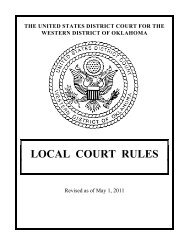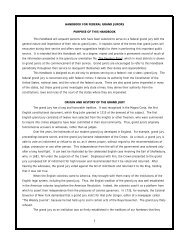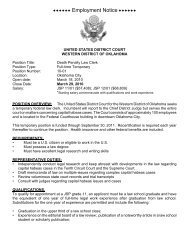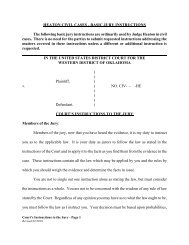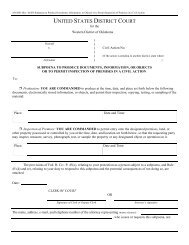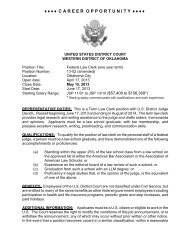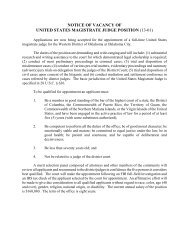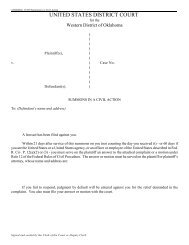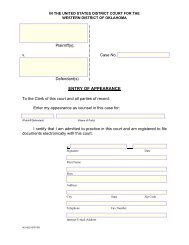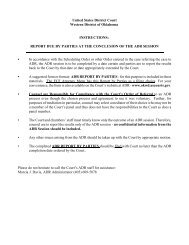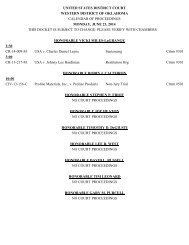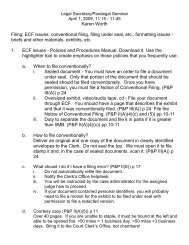united states district court western district of oklahoma local civil ...
united states district court western district of oklahoma local civil ...
united states district court western district of oklahoma local civil ...
Create successful ePaper yourself
Turn your PDF publications into a flip-book with our unique Google optimized e-Paper software.
8. LCvR 55.1<br />
A. The Proposed Change<br />
Procedure for Obtaining Default Judgment.<br />
(a) Entry <strong>of</strong> Default by Court Clerk. To obtain an entry <strong>of</strong> default<br />
pursuant to Fed. R. Civ. P. 55(a), the party must file a “Motion for Entry <strong>of</strong><br />
Default by the Clerk.” The motion shall recite the facts that establish service <strong>of</strong><br />
process, and be accompanied by affirmations as to compliance with the<br />
Servicemembers Civil Relief Act, 50 U.S.C. App. § 501 et seq., and that the<br />
individual is neither an infant nor an incompetent person. No brief is required with<br />
this motion. Once a proper motion has been filed, the Court Clerk will prepare and<br />
enter default, after independently determining that service has been effected, that<br />
the time for response has expired, and that no answer, responsive pleading, or<br />
appearance has been filed.<br />
(b) Entry <strong>of</strong> Default Judgment. Once a party is in default, a default<br />
judgment pursuant to Fed. R. Civ. P. 55(b) may be requested by filing a motion for<br />
default judgment accompanied by a concise brief, a form <strong>of</strong> judgment, and an<br />
affidavit setting forth that movant’s claim is for a particular sum certain and the<br />
factual basis for such a claim. In its discretion, the Court may set a hearing on the<br />
motion with respect to which notice shall be provided by the party moving for<br />
default judgment in accordance with the requirements <strong>of</strong> Fed. R. Civ. P. 55(b).<br />
The Court Clerk shall not enter a judgment <strong>of</strong> default.<br />
B. Reason for the Change<br />
The <strong>local</strong> rule is inconsistent with Federal Rule <strong>of</strong> Civil Procedure 55 in<br />
four respects:<br />
First, the <strong>local</strong> rule requires a motion for the Clerk’s certification <strong>of</strong> a<br />
default, and the federal rule does not require a motion. The result creates<br />
not only an inconsistency with the federal rule, but also practical problems.<br />
For example, the filing <strong>of</strong> a motion triggers the service requirement and<br />
response deadline in LCvR 7.1(g), even though Federal Rule <strong>of</strong> Civil<br />
Procedure 5(a) expressly provides that service is generally unnecessary for<br />
“a party who is in default for failing to appear.” In addition, the filing <strong>of</strong> a<br />
“motion” suggests the need for <strong>court</strong> action. But “[w]hen the prerequisites<br />
<strong>of</strong> Rule 55(a) are satisfied, an entry <strong>of</strong> default should be made by the clerk<br />
without any action being taken by the <strong>court</strong>.” 10A Charles Alan Wright,<br />
22



